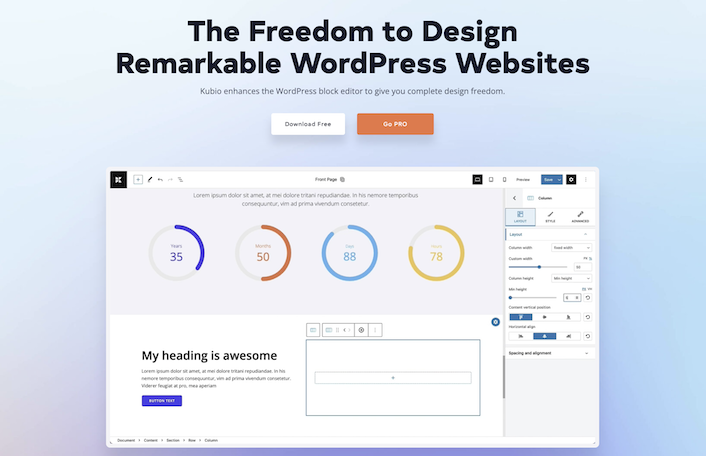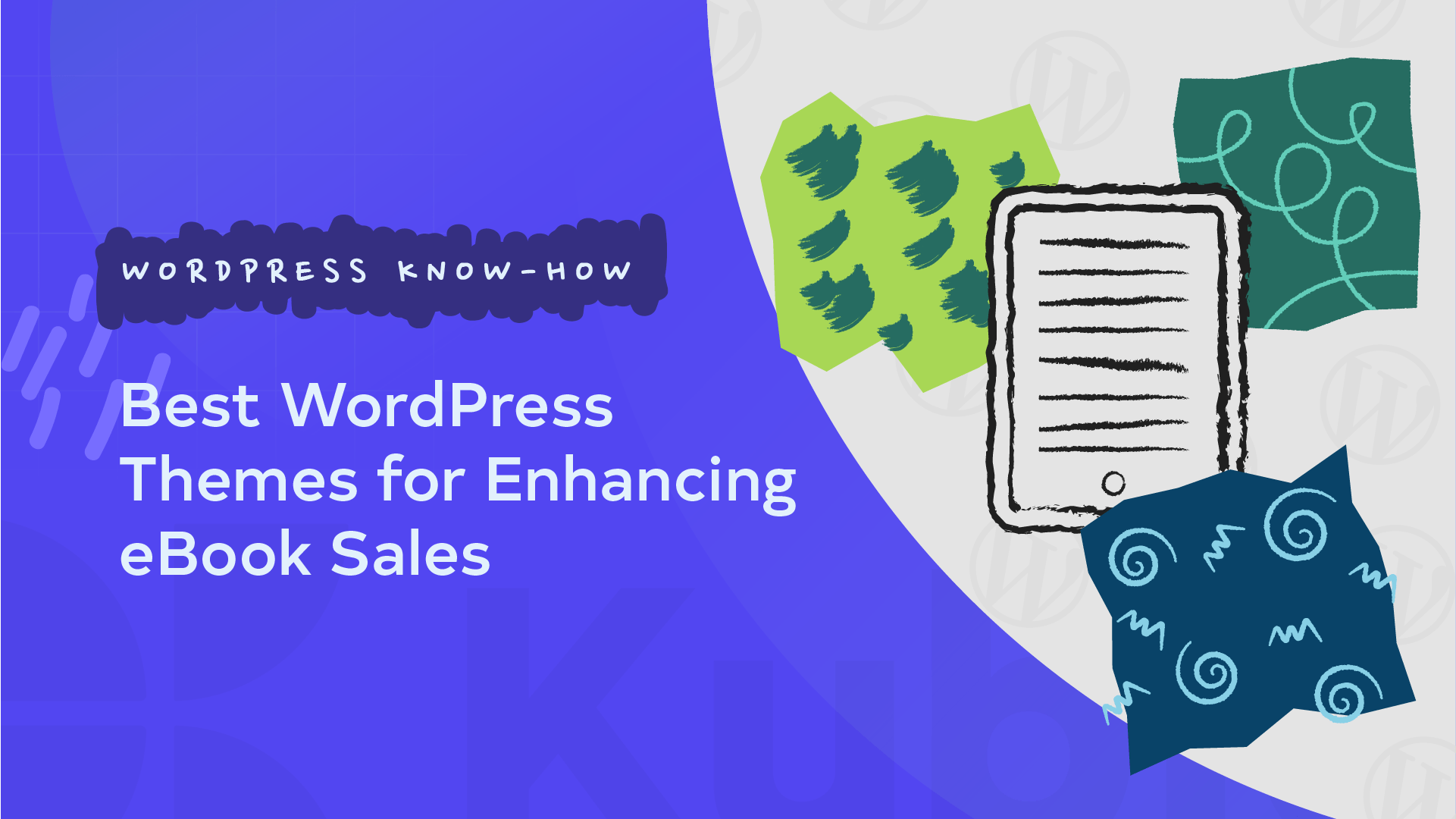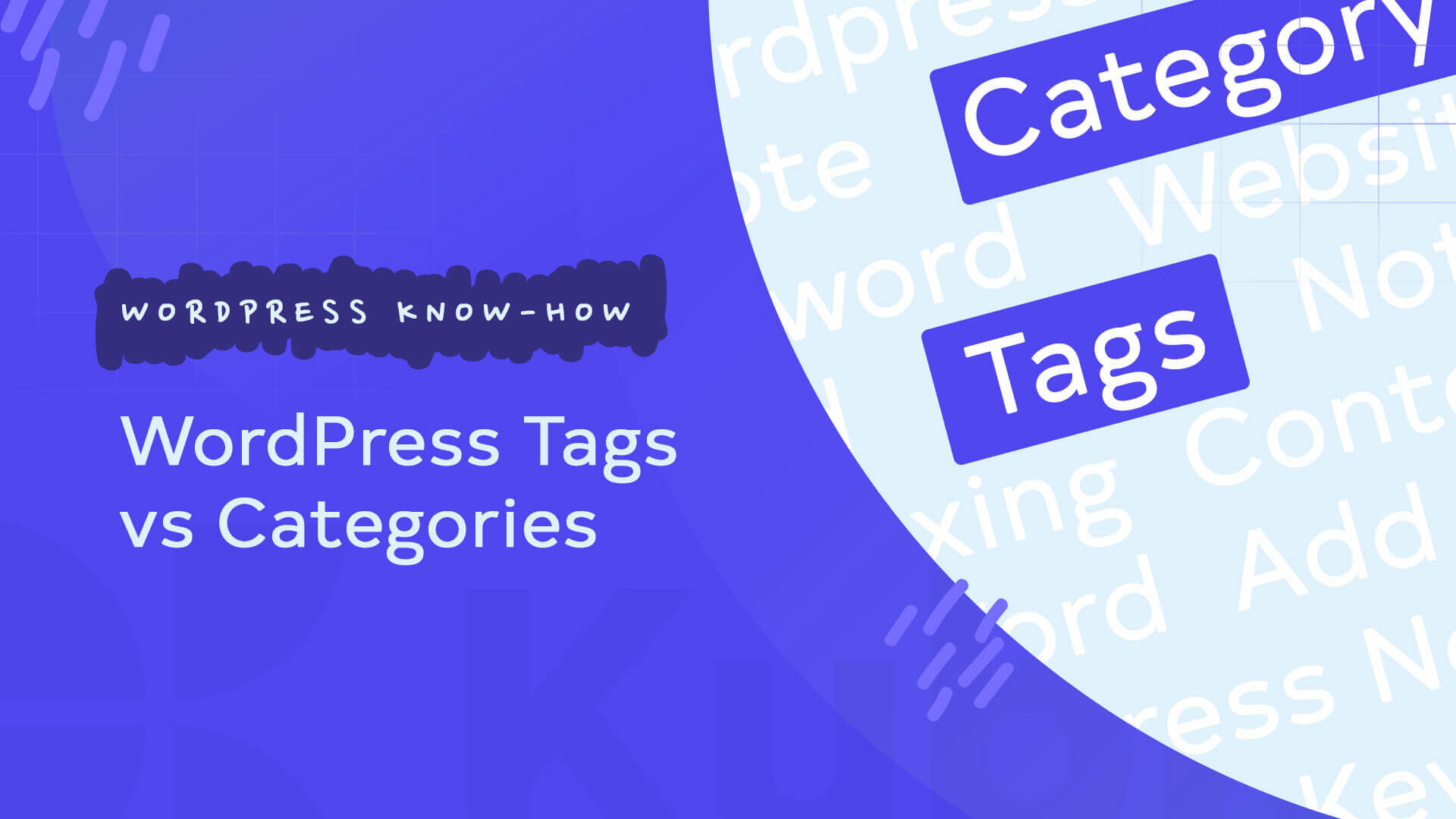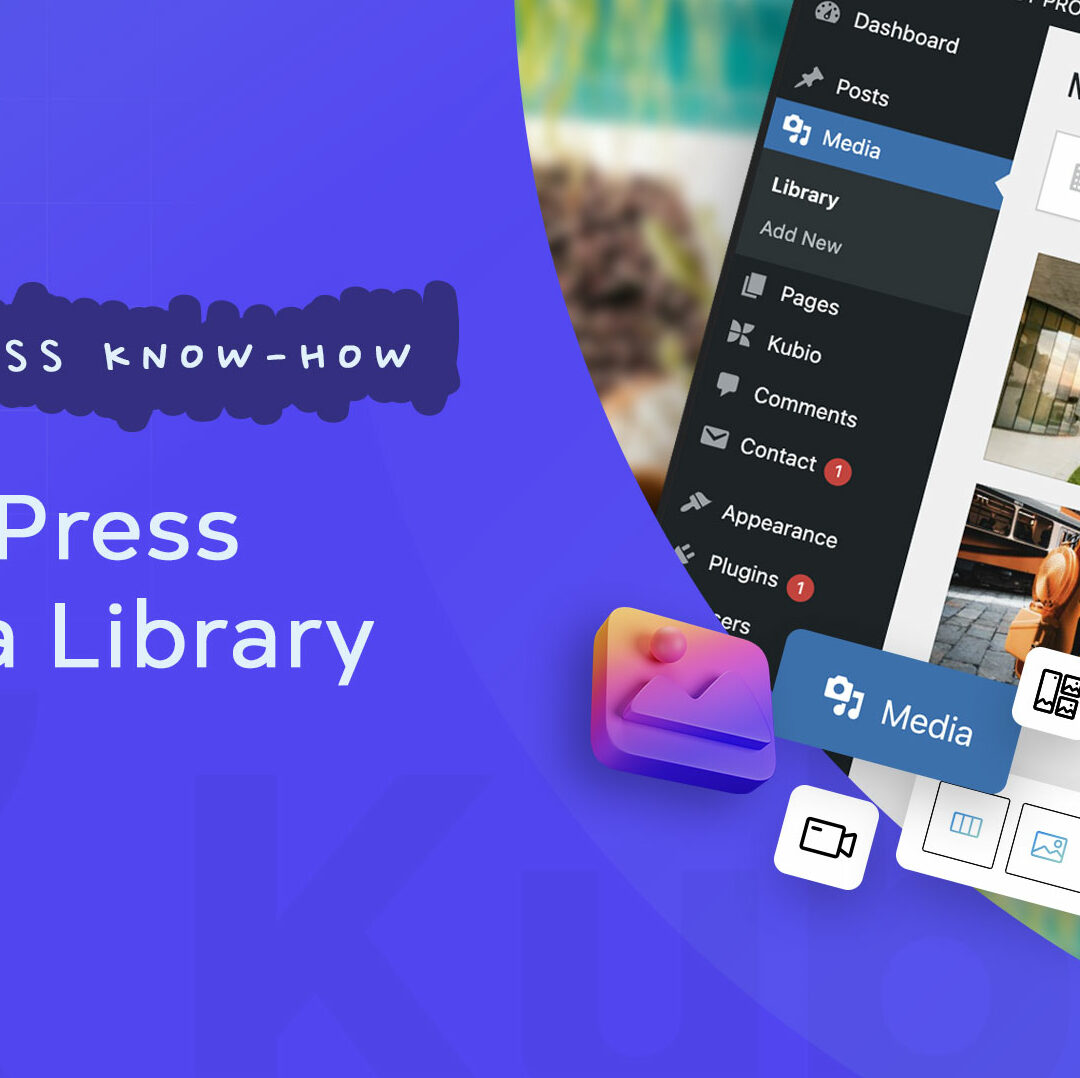The rise of eBooks has revolutionized publishing across the world, with fewer traditional gatekeepers and major improvements in convenience, accessibility, and conversion.
Aspiring writers, publishers, and digital booksellers are all making use of the functionality of WordPress, but where do you begin?
With over 65% of websites using WordPress as the content management system (CMS), it is no wonder that WordPress is the chosen platform for eCommerce, particularly when it comes to selling eBooks.
When selling eBooks on WordPress, there are a couple of things you are going to want to look out for. From looking for an appropriate eBook WordPress theme, to how to use WooCommerce to enhance your sales, this article will cover some of our favorite tips and tricks for self-marketing your eBook online.
The rise of eBooks: A golden opportunity for authors and publishers
eBooks have become an increasingly popular opportunity for both authors and publishers. No longer bound by the constraints of traditional publishing, writers are able to explore new genres and reach global audiences with digital products in a way that wasn’t previously possible.
Reading can now be an immersive experience, with digital formats allowing for multimedia integration and the use of interactive features such as external links, saved progress, and jumping to internal chapters. eBooks empower readers with customizable features, enabling adjustments such as screen contrast and font preferences for improved readability. They allow compatibility with screen readers and encourage eBook designers to prioritize inclusivity.
According to Pew Research, 30% of respondents had read an eBook in 2021, compared to just 16% in 2011. This is particularly prevalent on mobile devices that allow for easy digital downloads.
As the accessibility of eBooks transcends geographical boundaries, it removes the challenges associated with traditional retail distribution and costly shipping logistics.
Independent authors can now self-publish without a significant investment, while smaller publishing houses can collaborate with a broader array of writers, creating diverse catalogs of books. The eBook’s affordability and accessibility offer authors an ideal solution for sharing their work, eliminating many of the challenges of traditional publishing.
Why choose WordPress for selling eBooks?
When it comes to selling eBooks, many writers automatically consider platforms like Amazon as the go-to choice. While Amazon certainly offers some advantages to eBook sellers, such as global reach and the simplicity of not having to create or maintain a full website, there are also some disadvantages for authors and publishers to consider:
- On Amazon, the profit margins tend to be much smaller, as Amazon takes a noticeable cut of all sales.
- The eBook market on Amazon is already highly saturated. This means that competition is high, and standing out on a platform with thousands of other authors isn’t easy.
An excellent alternative, especially for authors and publishing houses willing to invest in marketing, is selling eBooks through sales pages on your own WordPress website. This is advantageous for a number of reasons:
- Creating your own eBook website allows you to nurture your brand, reinforcing your unique identity as an author or publisher.
- Selling directly from your website enables you to retain the full profit from each sale, ensuring that your hard work is appropriately rewarded.
- You gain complete control over pricing, promotions, and marketing strategies, enabling you to tailor your approach to your target audience’s needs.
- WordPress-based eBook stores can also accommodate multiple formats (ePub, PDF, etc.), appealing to a broader audience and ensuring compatibility with various e-readers and devices.
Exploring the top 5 WordPress themes for selling eBooks
Choosing the right WordPress theme is a crucial first step when entering the world of online eBook sales. Your website’s design plays a crucial role in attracting potential buyers and providing a pleasant shopping experience.
With that in mind, let’s explore the top 5 WooCommerce-compatible WordPress themes that can elevate your eBook-selling journey.

1. Kubio
While not strictly a theme, Kubio’s web builder has all the tools you need to create any site you’d like – including starter sites for initial creation.
- Kubio is a powerful web builder that is a versatile and user-friendly web development platform, allowing you to effortlessly create stunning, effective, and intuitive websites.
- It’s AI-powered page builder allows you to instantly create a customized first draft of your website that you can tweak and edit to make just right. This cuts down a ton of the time and mental energy associated with looking through potential themes, starter sites, or building a website from scratch.
- Featuring section- and block-based design, it allows you to create and customize your eBook website effectively. With the flexibility to add, remove, and modify blocks, pages, and headers, you can craft a distinctive online presence.
What sets Kubio apart is its access to dozens of starter sites, providing a wide variety of themes you can personalize to suit your brand.
2. Authority Pro
Authority Pro by StudioPress is another option for authors and publishers seeking to elevate their eBook sales. Its clean and professional design is complemented by user-friendly customization options, enabling easy integration of logos and branding.
With mobile responsiveness and integrated SEO features, you can establish your eBook website without advanced technical skills. This enhances online visibility, making it simpler for potential readers to find your eBooks and boost your sales.

3. Neve
For those prioritizing speed and performance on their eBook WordPress site, Neve by Themeisle is also a strong contender. Its lightweight design ensures fast-loading pages, providing a seamless user experience. Neve stands out with enhanced WooCommerce features like ‘quick view’ and ‘floating cart,’ improving the purchasing journey for customers and optimizing the online sales process for authors and publishers.

4. Float
Float by Themify offers a vibrant and colorful template. This theme is designed to engage and immerse your audience and has a built-in floating parallax scroll effect that adds visual appeal and enhances the user experience.
Float’s responsive design ensures your eBook store works across all devices, catering to a wide range of readers. You can integrate Google fonts, allowing for creative typography choices that align with your eBook’s personality. Its intuitive user interface simplifies navigation, making it easy for visitors to explore and purchase your eBooks.

5. Balance
Balance by WPZOOM puts your eBook at center stage and highlights your work beautifully. This theme provides valuable flexibility through its visual customizer, enabling you to easily manage global fonts and colors to align with your brand identity.
Its user-friendly drag-and-drop functionality allows you to create a visually appealing and customized eBook website effortlessly. This theme also simplifies the integration of essential widgets, including social media icons and MailChimp, enhancing your site’s functionality and engagement capabilities. Authors can easily create a compelling and user-friendly eBook bookshop with this theme.
Unleashing the power of Kubio’s tailored theme for writers
The “Writer” starter site is the perfect launching pad for creating your author website and getting those all-important first eBook sales.

Kubio’s user-friendly interface also enables you to build your entire website with ease. Its block- and section-based building approach ensures you can quickly create stunning and highly functional webpages, without needing to be an expert in coding.
Additionally, Kubio offers a variety of ready-made sections, including portfolio displays, engaging blogs, compelling CTAs, user reviews, contact forms, FAQs, and transparent pricing information. With Kubio, crafting an exceptional author website and eBook sales platform is both easy and accessible.
Setting up WooCommerce for your eBook website
WooCommerce provides a simple and proven interface for selling products online, including digital downloads. If you don’t already have WooCommerce on your site, it’s easy to add it.
Here’s a quick guide:
- Install and activate WooCommerce
In your WordPress dashboard, navigate to Plugins and then click on Add New. From here, search for WooCommerce and then install it. Once activated, WooCommerce will guide you through a setup wizard.
- Configure eCommerce settings
Follow the prompts to configure your eCommerce settings, including payment options, shipping, and taxes.
- Add WooCommerce downloadable product from backend
- Log in to your WordPress dashboard.
- Hover over the “+ New” button at the top of the page, and select “Product” from the dropdown menu to create a new product.
- Enter product details.
- Choose product type: Scroll down to the Product Data section and choose Downloadable from the dropdown menu. This step designates your product as a downloadable one.
- File upload: Once you’ve selected Downloadable, you’ll see an option to add a file. Click on Choose File to upload your eBook file from your computer. Ensure the file format adheres to WooCommerce’s compatibility requirements.
- Set download limit and expiry: Specify how many times customers can download the file and for how long the download link will remain active.
- Publish: Once you’ve configured all the necessary settings, click the Publish button to make your eBook product live on your WooCommerce-powered website.
- Test to make sure it all works.
With WooCommerce running on your Kubio-powered WordPress site, you can create an aesthetically pleasing and functional eBook bookshop. Kubio helps you build a fantastic site, while WooCommerce allows you to facilitate secure transactions and provide a satisfying shopping experience for your readers. This combination allows you to focus on your eBook content and marketing, knowing that your eCommerce platform is poised for success.
Benefits of WooCommerce for selling eBooks
Unlocking the potential of WooCommerce for your eBook sales involves understanding the benefits it offers. From versatile payment gateways to an extensive range of extensions and built-in scalability, WooCommerce equips your WordPress eBook website with the tools needed to thrive in the digital market.
- A variety of integrated payment gateways: WooCommerce offers versatile payment gateway integrations, allowing you to select from a range of payment options that align with your customer preferences. From credit card payments to digital wallets, WooCommerce ensures a seamless and secure transaction process, enhancing convenience for both you and your eBook purchasers. With the availability of plugins, you can easily collect payments through popular services such as Square, Stripe, PayPal, and more, giving you the freedom to choose the payment system that best suits your needs and your audience’s preferences.
- Wide range of extensions: You can expand your eBook website as needed with plenty of WooCommerce extensions. For example, you could use extensions to build a subscription service, or get advanced analytics for your store.
- WooCommerce is scalable: WooCommerce is designed with scalability in mind. If your eBook gains traction and you decide to expand by creating additional downloadable content for your audience, WooCommerce can support your growth. This scalability ensures that as your eBook sales increase, your eCommerce platform will continue to provide the necessary infrastructure and features to meet your evolving needs, allowing you to focus on creating quality content and serving your expanding readership.
Setting up WooCommerce on your WordPress eBook website allows you to sell your eBooks with secure payment processing and the flexibility to grow your site as your needs evolve. With WooCommerce, you have a robust eCommerce platform at your fingertips to enhance your online bookstore and increase eBook sales.
Enhance your eBook sales: Tips and tricks
When it comes to self-publishing, the key to success lies in your ability to market your eBook effectively. With powerful website builders like Kubio, you can level up your eBook promotion in the following ways:
Check and double-check your eBook for quality
A quality eBook needs professional editors, and you can find them by using reputable platforms like BookBaby, ACES, and the Editorial Freelance Society. These services connect you to editors who can ensure that your content is error-free and successfully voices the message you’re trying to convey.
Guest blogging
Get writing (again!). Remember to use your existing skills to your advantage, so consider writing guest posts for websites that already reach your target audience. Include links to your website, and think about offering discount codes if that is possible.
Use an email marketing campaign and social media
Harnessing the power of email marketing offers numerous benefits for eBook authors and publishers. While social media platforms like Facebook, Twitter, Instagram, and TikTok are valuable, the reliability of email marketing remains unmatched.
With email, you can establish direct communication with your audience, nurture leads, and drive eBook sales effectively. Kubio makes it easy to set up sign-up forms on your website, allowing you to collect emails online.
Kubio’s integration capabilities enable you to effortlessly incorporate sign-up forms into your website, helping you engage potential readers through email campaigns and various social media platforms, thereby solidifying your robust online presence.
Encourage readers to leave reviews
Social proof is a powerful tool for authors. Showcase positive reviews prominently on your eBook website with Kubio, as well as across your various social media platforms. You should also handle negative reviews professionally and resist the urge to respond emotionally, however difficult that may seem.
Collaborate with influencers
Connect with book lovers on accounts like myfriendsarefiction, or in online communities like Bookstagram and BookTok. Consider giving advanced copies of your eBook ahead of your book launch, or offering incentives for them to feature it.
Track, adapt, and improve
You can install a Google analytics plugin on your Kubio-built site to gain valuable insights and enhance your website’s performance. Track user behavior, adapt strategies, and maximize your eBook’s online visibility. Don’t be afraid to make changes where necessary, or to focus on different marketing channels to maximize your eBook’s online visibility.
By combining these tips and tricks with a well-designed eBook WordPress theme built on web builders like Kubio, you will be equipped with the tools needed to elevate your eBook sales and effectively tell your story.
Unlock your eBook’s potential and elevate your self-publishing journey with Kubio
Launching your eBook on your own bookshop site may seem challenging, but the benefits can make all that effort worth it. Lower production costs and higher profit margins can help ensure your hard work is rewarded, and full control over marketing and sales empowers you to optimize your eBook’s reach and impact.
There’s no doubt that a well-executed marketing plan and a compelling website can drive book sales. The Kubio Web Builder offers customizability, AI-powered webpage generation, fully functioning starter sites, a huge variety of theme options, and a no-code approach to web design, making it the ideal choice for authors and publishers looking to establish a strong online presence.
Download Kubio today and take the first step towards creating a captivating eBook website. Your literary journey begins here, so make Kubio your trusted partner in making it a resounding success!






